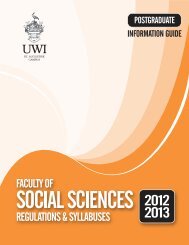Faculty of Humanities and Education (Postgraduate) - The University ...
Faculty of Humanities and Education (Postgraduate) - The University ...
Faculty of Humanities and Education (Postgraduate) - The University ...
Create successful ePaper yourself
Turn your PDF publications into a flip-book with our unique Google optimized e-Paper software.
50<br />
POSTGRADUATE REGULATIONS & SYLLABUSES 2012 - 2013<br />
THE FACULTY OF HUMANITIES & EDUCATION<br />
YEAR I<br />
SEMESTER I<br />
COURSE CODE: LANG 6000<br />
COURSE TITLE: ADVANCED ACADEMIC ENGLISH WRITING<br />
SKILLS<br />
NUMBER OF CREDITS: 4<br />
COURSE DESCRIPTION <strong>The</strong>re are particular English language<br />
skills which are necessary for students working at the postgraduate<br />
research level. <strong>The</strong>se include specific skills in both speech <strong>and</strong><br />
writing, which may or may not have been acquired in their<br />
undergraduate study. This course seeks to ensure competency<br />
in the requisite skills. Advanced Academic English Language<br />
Skills will require intense involvement on the part <strong>of</strong> students in<br />
activities which include expository <strong>and</strong> argumentative writing<br />
with focus on research/report writing, interactive/collaborative<br />
sessions such as class presentations, peer critiquing/reviewing<br />
<strong>and</strong> group work. Students will also be afforded the opportunity<br />
to enhance their linguistic abilities by processing <strong>and</strong> evaluating<br />
texts with varying types <strong>of</strong> Content <strong>and</strong> structural organisation.<br />
Students will be required to maintain a portfolio in which all<br />
work/ assignments will be kept.<br />
Mode <strong>of</strong> Delivery: Seminars <strong>and</strong> Workshops<br />
Assessment: (100% Course Work)<br />
• Research Paper 25% -approximately 2,000 words.<br />
• Portfolio 15% (collection <strong>of</strong> writing assignments <strong>and</strong> class<br />
exercises undertaken throughout the semester)<br />
• In Course Test I 15% (summary)<br />
• In Course Test II 20% (Response to or Critique <strong>of</strong> Academic<br />
Text)<br />
• In Course Test III 15% (10-15 minute oral presentation in<br />
seminar on research topic)<br />
YEAR I<br />
SEMESTER I<br />
COURSE CODE: LING 6404<br />
COURSE TITLE: THE GRAMMAR OF ENGLISH:<br />
AN EXTRAPOLATORY APPROACH<br />
NUMBER OF CREDITS: 4<br />
PRE-REQUISITES: LING 2402<br />
COURSE DESCRIPTION Because linguists’ contributions to the<br />
underst<strong>and</strong>ing <strong>of</strong> the structure <strong>of</strong> English are <strong>of</strong>ten masked within<br />
very specialist theoretical frameworks, this course seeks to make<br />
their discoveries available to persons interested in the grammar<br />
<strong>of</strong> English for practical utility <strong>and</strong> application, rather than with a<br />
focus on the theoretical constructs within which these discoveries<br />
are usually presented. Starting with particular language<br />
structures actually occurring within English language data, the<br />
course will allow the student to work out the grammatical rules<br />
that underpin these structures, at each stage checking these out<br />
against the descriptions within the appropriate linguistic texts as<br />
well as within traditional prescriptive grammars <strong>of</strong> English.<br />
ASSESSMENT:<br />
• In-course assessments:4 descriptive <strong>and</strong> evaluative activities<br />
(15% each)<br />
• 1 short Research Paper on a selected feature <strong>of</strong> English as<br />
used in a (named) Caribbean context or as produced by<br />
students <strong>of</strong> a specific foreign language background (5,000<br />
words) (40%)<br />
YEAR I<br />
SEMESTER II<br />
COURSE CODE: LING 6406<br />
COURSE TITLE: THE PRONUNCIATION AND SPELLING OF<br />
ENGLISH<br />
NUMBER OF CREDITS: 4<br />
PRE-REQUISITES: LING 2402<br />
COURSE DESCRIPTION <strong>The</strong> interface between pronunciation,<br />
inclusive <strong>of</strong> regional <strong>and</strong> social class accents, <strong>and</strong> spelling,<br />
requires study, as do the range <strong>of</strong> intervening factors such as<br />
etymology <strong>and</strong> morphology. <strong>The</strong>re is need for persons involved<br />
pr<strong>of</strong>essionally with English to have a scientific underst<strong>and</strong>ing<br />
<strong>of</strong> the principles underpinning phonological systems across<br />
dialects <strong>of</strong> English, the spelling system <strong>of</strong> English, <strong>and</strong> the factors<br />
which affect the relationship between pronunciation <strong>and</strong><br />
orthography. <strong>The</strong> course will examine the phonological features<br />
<strong>of</strong> the major accents <strong>of</strong> English (working from both actual spoken<br />
language data as well as data derived from written sources) <strong>and</strong><br />
Identify <strong>and</strong> explore the principles underpinning the spelling<br />
conventions <strong>of</strong> English (based on actual spelling usage within<br />
texts written in English within international corpora <strong>of</strong> English).<br />
ASSESSMENT:<br />
• 4 practical in-course analytical exercises on features <strong>of</strong> the<br />
pronunciation <strong>and</strong> spelling <strong>of</strong> English (15% each)<br />
• 1 Research Paper (40%)<br />
YEAR I<br />
SEMESTER II<br />
COURSE CODE: LING 6302<br />
COURSE TITLE: THE SOCIOLINGUISTICS OF WEST INDIAN<br />
LANGUAGE AND SOCIETY<br />
NUMBER OF CREDITS: 4<br />
PRE-REQUISITES: LING 2302<br />
COURSE DESCRIPTION: Students in this course will learn to<br />
describe precisely the nature <strong>of</strong> the linguistic l<strong>and</strong>scape in<br />
the wider Caribbean region, <strong>and</strong> analyse critically the social,<br />
political, economic, environmental <strong>and</strong> legal issues associated<br />
with these languages. <strong>The</strong>y will also learn to evaluate the issues<br />
peculiar to minority <strong>and</strong> indigenous languages, with special<br />
reference to the wider Caribbean region <strong>and</strong> will be able to<br />
recognise <strong>and</strong> evaluate the issues <strong>and</strong> processes involved in<br />
making <strong>and</strong> implementing policy for vernacular languages.<br />
<strong>The</strong>y will analyse critically the various approaches to the study<br />
<strong>of</strong> language situations which have been adopted by linguists<br />
over the past five (5) decades, with special reference to attempts<br />
to account for <strong>and</strong> describe variation in non-st<strong>and</strong>ard Language<br />
varieties. <strong>The</strong>y will identify the possible approaches to research<br />
on Caribbean languages, with special reference to variation.<br />
Mode <strong>of</strong> Delivery: Seminars<br />
Assessment: 100% Coursework<br />
• Sociolinguistic pr<strong>of</strong>ile <strong>of</strong> a particular Caribbean territory<br />
(30%);<br />
• Critical analysis <strong>of</strong> specified sociolinguistic approaches to<br />
description <strong>of</strong> Caribbean territories (40%);<br />
• Preparation <strong>of</strong> Language policy proposal for a named<br />
Caribbean territory (30%)

















